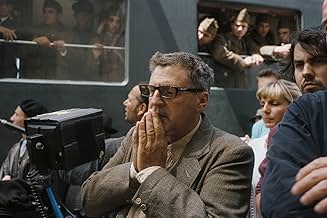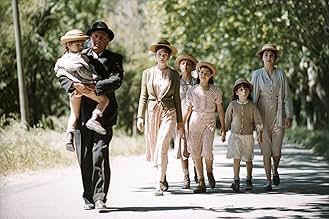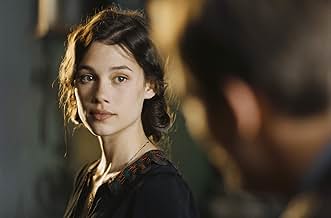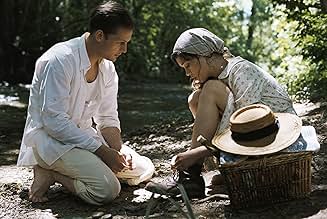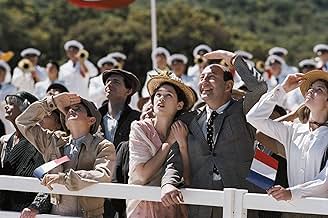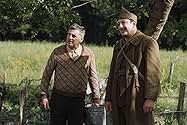La fille du puisatier
- 2011
- Tous publics
- 1h 47m
IMDb RATING
7.0/10
4.4K
YOUR RATING
In 1930s southern France, a father is torn between his sense of honor and his deep love for his daughter when she gets in trouble with the wealthy son of a shopkeeper.In 1930s southern France, a father is torn between his sense of honor and his deep love for his daughter when she gets in trouble with the wealthy son of a shopkeeper.In 1930s southern France, a father is torn between his sense of honor and his deep love for his daughter when she gets in trouble with the wealthy son of a shopkeeper.
- Director
- Writers
- Stars
- Awards
- 2 wins total
- Director
- Writers
- All cast & crew
- Production, box office & more at IMDbPro
Featured reviews
Marcel Pagnol was a wonderful French writer, director and playwright. His stories are indeed classics and have been filmed, re-filmed and even re-filmed again. So, it's not at all surprising that Daniel Auteuil has decided to take a stab at Pagnol's classic stories--not just starring in them but writing the new screenplays and directing them. I say that's not surprising because not only are these wonderful stories, but Auteuil also has previously been in a couple other Pagnol stories--"Jean de Florette" and "Manon Des Sources". His four new films consist of this film, "The Well-Digger's Daughter" as well as the wonderful trilogy consisting of "Marius", "Fanny" and "Cesar"--which just recently debuted and which are not yet available here in the States. I cannot wait to see these three most recent movies.
"The Well-Digger's Daughter" is a story with many similarities to the Fanny Trilogy Auteuil made following this film. All are set in Provence, concern ordinary folks and are about the complications that arise from an unplanned pregnancy.
The story begins with the daughter, Patricia (Astrid Bergès-Frisbey) meeting a handsome young man, Jacques (Nicolas Duvauchelle) when she's on her way to bring her father, Pascal (Daniel Auteuil), his lunch. The audience KNOWS based on their meeting that the two are destined to be a number. However, there are some complications---such as Felipe (Kad Merad) wanting to marry Patricia. But, of course, much more serious complications arise--and I don't really want to get to them here--just see the film.
I love films about ordinary people--and Pagnol's are about as ordinary as you can find! Some may not be quite so captivated by these folks-- they aren't exactly rich, cultured or the Hollywood types. But, I am pretty ordinary as are 99% of movie viewers! So why not enjoy the lives and loves of folks we can relate to?! Plus, the story is so nicely written, lovingly directed and enjoyable that I strongly recommend you give it a try.
By the way, Pascal's grandson, who he treats as if it's HIS kid is actually Zachary Auteuil--the actor/director's real life son!
"The Well-Digger's Daughter" is a story with many similarities to the Fanny Trilogy Auteuil made following this film. All are set in Provence, concern ordinary folks and are about the complications that arise from an unplanned pregnancy.
The story begins with the daughter, Patricia (Astrid Bergès-Frisbey) meeting a handsome young man, Jacques (Nicolas Duvauchelle) when she's on her way to bring her father, Pascal (Daniel Auteuil), his lunch. The audience KNOWS based on their meeting that the two are destined to be a number. However, there are some complications---such as Felipe (Kad Merad) wanting to marry Patricia. But, of course, much more serious complications arise--and I don't really want to get to them here--just see the film.
I love films about ordinary people--and Pagnol's are about as ordinary as you can find! Some may not be quite so captivated by these folks-- they aren't exactly rich, cultured or the Hollywood types. But, I am pretty ordinary as are 99% of movie viewers! So why not enjoy the lives and loves of folks we can relate to?! Plus, the story is so nicely written, lovingly directed and enjoyable that I strongly recommend you give it a try.
By the way, Pascal's grandson, who he treats as if it's HIS kid is actually Zachary Auteuil--the actor/director's real life son!
This marvelous film is based on a Pagnol novel which I had never heard of. Maybe it's well-known in France and so the title is familiar to audiences there. But in the US "The Well Digger's Daughter" should keep people away from this film in droves. In fact, the film is an old fashioned fable set in the French countryside during the period of World War I. Even though the plot turns are seen coming a mile away, the film has such charm and simple feeling and wisdom, that there is enormous pleasure in watching the story unfold. Auteuil is perfect as the father, as is every other actor, especially Astrid Bergès-Frisbey as the daughter of the title and Nicolas Duvauchelle as her 'prince'. And the music by Andre Desplat is one of his best scores. The setting and the lives of the characters are so beautifully depicted, there is so much pleasure to be had in entering their world for two hours, that it seems a shame that American audiences will have to overcome their disinclination to see a movie about a well-digger and his daughter when there is this rich and deeply emotional story waiting for them in the cinema.
Remaking a Pagnol film is asking for trouble. Film snobs will dismiss the remake without giving it a chance, though 60 years ago those same film snobs probably dismissed Pagnol as a film director, finding him hopelessly inferior to Renoir or ... Afficionados of Raimu, an unquestionably great actor - when he had a good role - will say that no one can do what he did. And they would be right; no one can out-Raimu Raimu. A force of nature, because Raimu at his best was a force of nature, cannot be imitated or equaled. But a role can be done a different way, even if the words are the same, just as different great actors can succeed at Hamlet or King Lear. And yes, I speak of Shakespeare. Theater/literature snobs can guffaw, but who cares? Let them go about their business.
And I will go about mine, which is to talk about this movie, which is remarkably moving. Moving in part because Pagnol's script was a masterpiece, yes, but also because this is a very well-done realization of it.
The first thing that struck me about this movie was the color, when you see the scenery. Pagnol, for whatever reason, really didn't do a lot with scenery in his black and white movies. This movie shows what that deprived us of. It is done in the best tradition of the color versions of Jean de Florette, Manon des sources, La gloire de mon père, and Le château de ma mère. The countryside around Salon de Provence comes alive, and is beautiful.
I was also struck by the use of music, which again is not a high point in Pagnol's version. The Italian song, so wonderfully recorded by Caruso, is used in very moving ways here. Auteuil has a better sense of how to use music in a film than Pagnol did, at least with this script.
But the heart of this movie is Pagnol's text, and this cast, a great one, does it beautifully. True, at times, as I marveled at the genius of Pagnol's text, I wondered if that meant these actors were acting it, rather than becoming the characters. That may be true in some cases, though not for Kad Merad, who becomes Philippet every bit as much as Fernandel did. I can hear Raimu reciting the lines Daniel Auteuil speaks, and beautifully, perhaps because they are so different, certainly because Raimu delivered them in a way that engraved them in my memory. But Auteuil makes them very moving as well. He is not a force of nature as Raimu was, but his Pascal is also a real character.
What I realized, over and over again watching this movie, is that the script was indeed written by a playwright, and Auteuil respects that. We still have fully-developed scenes, as movies used to have when they were still imitating theater. And, as a result, with this great script and these great actors, we have deeply moving moments, such as when Pascal says goodbye to his daughter, sending her off to raise her bastard child elsewhere. Or, even more deeply moving, when the parents of the father of her child, having just lost their son in the war, come to see the child, the last remnant of their now lost son. Every line of that scene is deeply moving: Pascal's pride in his grandson, the parents' grief and longing for their son. (I didn't care for the mother's final admission that she burned her son's letter rather than deliver it to Patricia; that was better done in the previous version.)
A film script is like a play: it can be done in more than one way, if it's worth doing - as this script most certainly is. It will not wipe away memories of Pagnol's 1940s version, nor should it. You don't have to forget Olivier's Hamlet to love Jacobi's, or Branaugh's, or ... I suspect the very film snobs who dismiss Pagnol's own work will cause this film not to enjoy the success it deserves, but that would be a real crime. This is, in fact, a wonderful realization of Pagnol's very beautiful, very wonderful script.
---------------------------------
I watched this movie again this evening, and really have nothing to add to what I wrote before, other than to say that it is a beautiful realization of Pagnol's script. Auteuil, Merad, and Darroussin are three of modern French film's finest actors, and they all give first-rate performances here. The often wonderful dialogue is delivered as in a great movie or play, lovingly and beautifully. Watch this. It's a deeply moving and wonderful movie.
And I will go about mine, which is to talk about this movie, which is remarkably moving. Moving in part because Pagnol's script was a masterpiece, yes, but also because this is a very well-done realization of it.
The first thing that struck me about this movie was the color, when you see the scenery. Pagnol, for whatever reason, really didn't do a lot with scenery in his black and white movies. This movie shows what that deprived us of. It is done in the best tradition of the color versions of Jean de Florette, Manon des sources, La gloire de mon père, and Le château de ma mère. The countryside around Salon de Provence comes alive, and is beautiful.
I was also struck by the use of music, which again is not a high point in Pagnol's version. The Italian song, so wonderfully recorded by Caruso, is used in very moving ways here. Auteuil has a better sense of how to use music in a film than Pagnol did, at least with this script.
But the heart of this movie is Pagnol's text, and this cast, a great one, does it beautifully. True, at times, as I marveled at the genius of Pagnol's text, I wondered if that meant these actors were acting it, rather than becoming the characters. That may be true in some cases, though not for Kad Merad, who becomes Philippet every bit as much as Fernandel did. I can hear Raimu reciting the lines Daniel Auteuil speaks, and beautifully, perhaps because they are so different, certainly because Raimu delivered them in a way that engraved them in my memory. But Auteuil makes them very moving as well. He is not a force of nature as Raimu was, but his Pascal is also a real character.
What I realized, over and over again watching this movie, is that the script was indeed written by a playwright, and Auteuil respects that. We still have fully-developed scenes, as movies used to have when they were still imitating theater. And, as a result, with this great script and these great actors, we have deeply moving moments, such as when Pascal says goodbye to his daughter, sending her off to raise her bastard child elsewhere. Or, even more deeply moving, when the parents of the father of her child, having just lost their son in the war, come to see the child, the last remnant of their now lost son. Every line of that scene is deeply moving: Pascal's pride in his grandson, the parents' grief and longing for their son. (I didn't care for the mother's final admission that she burned her son's letter rather than deliver it to Patricia; that was better done in the previous version.)
A film script is like a play: it can be done in more than one way, if it's worth doing - as this script most certainly is. It will not wipe away memories of Pagnol's 1940s version, nor should it. You don't have to forget Olivier's Hamlet to love Jacobi's, or Branaugh's, or ... I suspect the very film snobs who dismiss Pagnol's own work will cause this film not to enjoy the success it deserves, but that would be a real crime. This is, in fact, a wonderful realization of Pagnol's very beautiful, very wonderful script.
---------------------------------
I watched this movie again this evening, and really have nothing to add to what I wrote before, other than to say that it is a beautiful realization of Pagnol's script. Auteuil, Merad, and Darroussin are three of modern French film's finest actors, and they all give first-rate performances here. The often wonderful dialogue is delivered as in a great movie or play, lovingly and beautifully. Watch this. It's a deeply moving and wonderful movie.
Daniel Auteuil is one of my favorite actors... in the world.
I rented this film earlier tonight from Video Futur, a French movie rental chain, after missing it at the cinéma. My girlfriend and I just finished watching it. Wow.
It's fantastic !!! Of course, you should start with the Marcel Pagnol classics like Jean de Florette and Manon des Sources. Read the books, watch the films, fall in love with the south of France. If you're already familiar with the works of Pagnol, you can jump right in and enjoy. Heck, even if you're not familiar with them, watch this film anyway.
In my opinion, Provence is the most beautiful place in France, and possibly the world. Pagnol used real locations in Provence, including Aubagne, Salon, and other locales as the settings for his best dramas.
This is no exception. La fille du puisatier (English: The welldigger's daughter) is a well-crafted story that I believe Americans, and cinema fans all over the world, will enjoy. The film is an excellent and faithful adaptation of Pagnol's original story, and the actors' performances elevate this film to the highest level.
Auteuil, along with co-stars Kad Merad and Jean-Pierre Darroussin knock this thing out of the park. I remember Merad and Darroussin from other films, including L'immortel (English: 22 bullets), but this takes the cake.
This is not to take away from the amazing performances of the daughter in the title, Astrid Bergès-Frisbey as Patricia Amoretti, as well as the solid performance of Emilie Cazenave as her sister Amanda.
All in all, great acting, great writing (based on an already-good story) and beautiful cinematography, made for a completely enjoyable viewing experience, at least for us.
I hope this comes out soon in the US so that American audiences can see for themselves.
I remember seeing Jean de Florette and Manon des Sources (English: Manon of the spring) in my high school French class. My teacher was nice enough to share some French movies with us. Decades later, I'm lucky enough to be living in France, putting all those French lessons to good use, enjoying Pagnol again, and dreaming, everyday, about moving back to the south.....to Provence.
I rented this film earlier tonight from Video Futur, a French movie rental chain, after missing it at the cinéma. My girlfriend and I just finished watching it. Wow.
It's fantastic !!! Of course, you should start with the Marcel Pagnol classics like Jean de Florette and Manon des Sources. Read the books, watch the films, fall in love with the south of France. If you're already familiar with the works of Pagnol, you can jump right in and enjoy. Heck, even if you're not familiar with them, watch this film anyway.
In my opinion, Provence is the most beautiful place in France, and possibly the world. Pagnol used real locations in Provence, including Aubagne, Salon, and other locales as the settings for his best dramas.
This is no exception. La fille du puisatier (English: The welldigger's daughter) is a well-crafted story that I believe Americans, and cinema fans all over the world, will enjoy. The film is an excellent and faithful adaptation of Pagnol's original story, and the actors' performances elevate this film to the highest level.
Auteuil, along with co-stars Kad Merad and Jean-Pierre Darroussin knock this thing out of the park. I remember Merad and Darroussin from other films, including L'immortel (English: 22 bullets), but this takes the cake.
This is not to take away from the amazing performances of the daughter in the title, Astrid Bergès-Frisbey as Patricia Amoretti, as well as the solid performance of Emilie Cazenave as her sister Amanda.
All in all, great acting, great writing (based on an already-good story) and beautiful cinematography, made for a completely enjoyable viewing experience, at least for us.
I hope this comes out soon in the US so that American audiences can see for themselves.
I remember seeing Jean de Florette and Manon des Sources (English: Manon of the spring) in my high school French class. My teacher was nice enough to share some French movies with us. Decades later, I'm lucky enough to be living in France, putting all those French lessons to good use, enjoying Pagnol again, and dreaming, everyday, about moving back to the south.....to Provence.
Another reviewer has rightly pointed out that the title of this film in English is going to keep audiences away from the English-speaking cinemas in droves. But the original French title of which it is a translation, LA FILLE DU PUISATIER, had to be retained in France. That is because it is a remake of a famous and classic film of 1940 directed by Marcel Pagnol from his own novel, and thus it needed to have the same title, so that French people would know what it was. The screenplay adaptation of the remake is by Daniel Auteuil, who also directed the film and starred in it (playing the part of the well-digger). Auteuil, one of France's most famous actors, has a long history of association with Marcel Pagnol's tales of early 20th century Provence. Those who like French movies will certainly remember the pair of immensely popular films based on Pagnol novels which were directed by Claude Berri and starred Daniel Auteuil, JEAN DE FLORETTE and MANON DES SOURCES (both 1986). At the moment three further Pagnol remakes are being filmed, with Auteuil in the leading role of César, of Pagnol's famous trilogy of films, known as 'The Marseilles Trilogy'. The individual tiles of the trilogy are CÉSAR, FANNY, and MARIUS. Let us hope that a full-fledged Pagnol revival gets going, as the old films as well as the new are a pure delight. Credit for keeping the flame alive must go to Pagnol's remarkable daughter, whom I visited long ago in her office on the far side of the Periphérique. She is a powerful and determined personality and she kept the old Pagnol films in distribution and arranged for all the new ones to be made, and is a fierce guardian of the integrity and continuity of the family's creative flame. The Pagnol films are about 'real people' in the South of France, where Pagnol came from, and the thick accents in the Marseilles Trilogy are a marvel to the ear, and as different from Parisian French as a Mississippi drawl is from the speech of an inhabitant of Brooklyn, or as an impenetrable Glasgow accent is from the way they speak in London. This film is a pure delight, beautifully directed by Auteuil, and featuring as his eldest daughter (the one of the title) a fresh young actress of the utmost charm named Astrid Bergès-Frisbey, aged 25, who is part Spanish and as beautiful as a rose petal sparking with Provencal dew in the morning. The story allows her to have been sent away and educated in Paris, to explain why she does not speak like the locals. She is absolutely perfect casting, has all the right qualities for the part, and does a wonderful job. Auteuil is, as usual, superb. The rest of the cast are also excellent. This is a very poignant and emotional tale, as Pagnol stories usually are, and I would rate it as an instant classic. Everyone should see it, though outside of France, I wonder how many really will. It would be a shame for anyone who enjoys and looks forward to a superb French film to miss it, as this is in the top rank.
Did you know
- TriviaJacques' motorcycle is a Triumph Speed Twin 5T.
- GoofsWhen Pascal visits her sister Nathalie to check on Patricia, Nathalie is heard humming Nina Rota's Romeo and Juliet theme, which wasn't written until 1968.
- ConnectionsRemake of La fille du puisatier (1940)
- SoundtracksCore 'n Grato
Written by Salvatore Cardillo and Alessandro Sisca
© BMG Ricordi Publishing
Avec l'autorisation d'Universal Music Vision
Sung by Enrico Caruso
(p) Recorded prior to 1972. All right reserved by BMG Music
Avec l'aimable autorisation de Sony Music Entertainment France
- How long is The Well-Digger's Daughter?Powered by Alexa
Details
- Release date
- Country of origin
- Official sites
- Language
- Also known as
- The Well-Digger's Daughter
- Filming locations
- Chapelle Saint-Sixte, Eygalières, Bouches-du-Rhône, France(some exteriors)
- Production companies
- See more company credits at IMDbPro
Box office
- Budget
- €12,500,041 (estimated)
- Gross US & Canada
- $386,368
- Opening weekend US & Canada
- $10,273
- Jul 22, 2012
- Gross worldwide
- $13,194,167
- Runtime1 hour 47 minutes
- Color
- Sound mix
- Aspect ratio
- 1.85 : 1
Contribute to this page
Suggest an edit or add missing content


